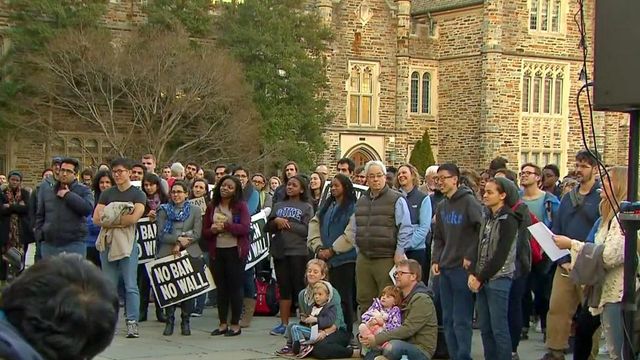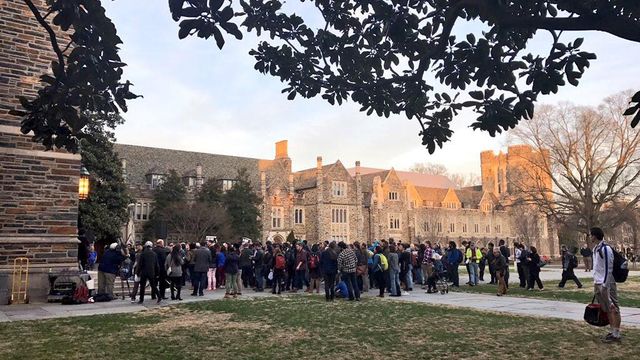Duke protester: Trump's travel ban is 'a problem for humanity'
Duke University students rallied Tuesday in protest of President Donald Trump's order halting immigration from several predominantly Muslim countries, saying the move is hurting students and faculty.
Posted — UpdatedUniversity officials said several dozen students, faculty and staff are from Iraq, Syria, Iran, Sudan, Libya, Somalia or Yemen, the countries affected by Trump's order. People who aren't U.S. citizens cannot enter the U.S. from those countries for at least 90 days.
"We’ve got Duke faculty members, Duke professors, who have been invited to teach in very prestigious visiting positions in Germany who are unable to return to their home," said Omid Safi, director of the Duke Islamic Studies Center.
Safi called Trump's order "a Muslim ban" and said it has created "absolute chaos" on campus.
"Duke is an international institution of higher learning. The best and brightest minds from around the world should be able to come to Duke to study," he said. "These are people who have valid visas to be in this country, to carry out their studies, to research, to think and to teach, and we should be honoring this. We should not be engaging in discriminatory practices."
At the open microphone forum in front to the Duke Chapel, students, many of whom were from other countries, expressed concern that Trump's executive order specifically targets and promotes profiling of a group of people.
"I feel like it's a problem for humanity and though it may not affect me directly, it affects others and I feel like I need to speak out against it and just offer my support," said protester Margaret Neuman.
Sophomore Sydney Roberts helped organize the protest rally to show support for Muslims on campus.
"It’s terrifying. We’re seeing our friends and our families targeted," said Roberts, who isn't Muslim. "We have people that go to class with us, that live with us, that work on this campus and live in Durham that are being targeted right now. This isn’t a time for us to sit back and wait for someone else to do something."
Roberts and other protest organizers called on Duke administrators to declare the campus a sanctuary that protects undocumented students and for the university to pay the legal fees of students not able to return to the U.S. because of the travel ban.
"If Duke wants to protect its students, it should put its money there. That's one thing Duke University has a lot of," Roberts said. "These students desperately need the university to care about them."
Duke spokesman Steve Hartsoe said officials had no comment on the question of paying for legal fees. He also referred to a December statement from Duke President Richard Brodhead saying a "sanctuary campus" has no basis in law and wouldn't add any protections for students not already in place, such as not providing student information to law enforcement without a subpoena.
"No university in America can declare itself immune from the rule of law," Brodhead said in the statement. "However, university campuses are governed by their own communal values and offer the protection of those values to those who live in them. Duke University values its students no matter their background or immigration status."
Duke sent a statement to students, faculty and staff who might be affected by the executive order strongly recommending that foreign nationals from impacted countries avoid all international travel for the immediate future.
• Credits
Copyright 2024 by Capitol Broadcasting Company. All rights reserved. This material may not be published, broadcast, rewritten or redistributed.






